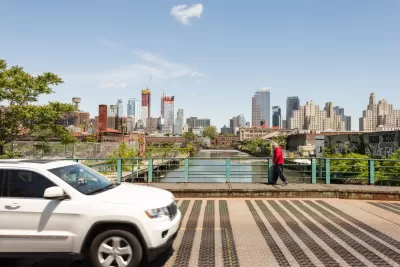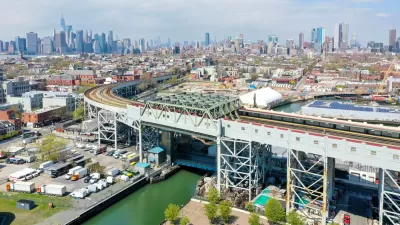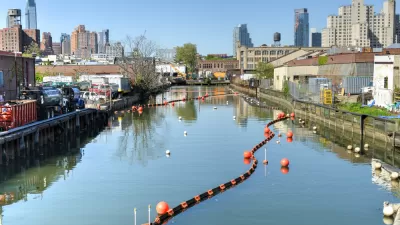An opinion piece makes the case that a rezoning proposal for the Brooklyn neighborhood of Gowanus has a higher potential for new affordable housing and lower risk of displacement compared to other rezoning plans in the city.

Michelle de la Uz, Brad Lander, and Barika Williams write an opinion piece to connect a planned rezoning for Gowanus in Brooklyn to issues of equity. By creating new opportunities for housing development, the Gowanus Neighborhood Rezoning would "move NYC forward on racial equity and fair housing," according to the opinion.
As noted in previous advocacy for the rezoning, the Gowanus Neighborhood Rezoning sticks out from rezoning plans completed during the de Blasio administration, because it would add density to a relatively wealthy neighborhood.
The proposed Gowanus Neighborhood Rezoning is the first city-sponsored neighborhood rezoning in a whiter, wealthier community. It asks those residents to absorb new growth in order to create new, permanent affordability in a high-opportunity neighborhood with strong transit access. It has far less risk of displacement. In contrast to prior rezonings, it would result in a higher percentage of affordable units in the neighborhood than exists today. For all these reasons, we have engaged in a community planning process for the last several years to try to get this rezoning right.
According to data cited in the article, the details of the proposed Gowanus Neighborhood Rezoning would allow a projected 8,200 new housing units, approximately 3,000 (37 percent) of which would be affordable: 2,000 units through the city's Mandatory Inclusionary Housing program, and another 950 units on the Public Place site, owned by the city.
As noted after the conclusion of the opinion piece, Michelle de la Uz is the executive director of the Fifth Avenue Committee, Brad Lander is a city councilmember representing Brooklyn, and Barika Williams is executive director of the Association for Neighborhood and Housing Development. The Fifth Avenue Committee recently published a report titled Undesign the Redline: Gowanus and the Association for Neighborhood and Housing Development recently published the Thriving Communities Coalition report. Both reports dig into the effects of exclusionary land use and real estate policies on the neighborhoods of New York City.
FULL STORY: Opinion: How the Gowanus Rezoning Could Push NYC Forward on Racial Equity

Planetizen Federal Action Tracker
A weekly monitor of how Trump’s orders and actions are impacting planners and planning in America.

Maui's Vacation Rental Debate Turns Ugly
Verbal attacks, misinformation campaigns and fistfights plague a high-stakes debate to convert thousands of vacation rentals into long-term housing.

Restaurant Patios Were a Pandemic Win — Why Were They so Hard to Keep?
Social distancing requirements and changes in travel patterns prompted cities to pilot new uses for street and sidewalk space. Then it got complicated.

In California Battle of Housing vs. Environment, Housing Just Won
A new state law significantly limits the power of CEQA, an environmental review law that served as a powerful tool for blocking new development.

Boulder Eliminates Parking Minimums Citywide
Officials estimate the cost of building a single underground parking space at up to $100,000.

Orange County, Florida Adopts Largest US “Sprawl Repair” Code
The ‘Orange Code’ seeks to rectify decades of sprawl-inducing, car-oriented development.
Urban Design for Planners 1: Software Tools
This six-course series explores essential urban design concepts using open source software and equips planners with the tools they need to participate fully in the urban design process.
Planning for Universal Design
Learn the tools for implementing Universal Design in planning regulations.
Heyer Gruel & Associates PA
JM Goldson LLC
Custer County Colorado
City of Camden Redevelopment Agency
City of Astoria
Transportation Research & Education Center (TREC) at Portland State University
Jefferson Parish Government
Camden Redevelopment Agency
City of Claremont





























